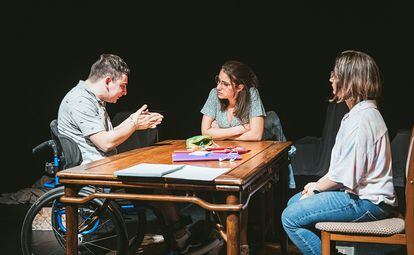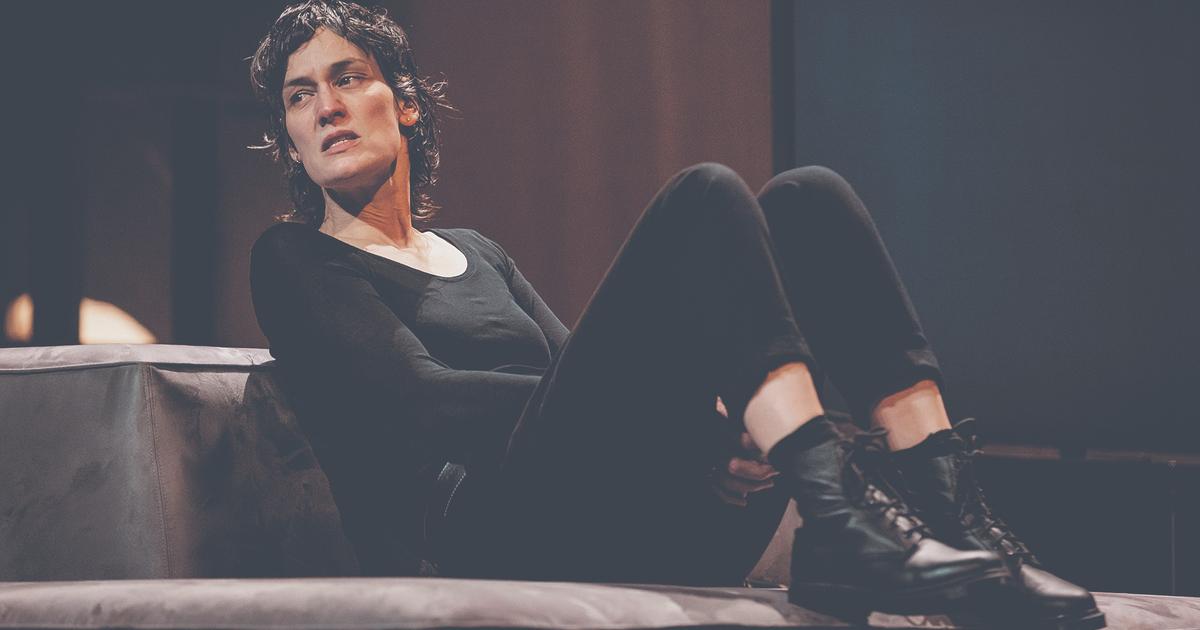The playwright and director
Peruvian Chela de Ferrari, founder of the prestigious La Plaza theater in Lima, heard one day four years ago one of the room ushers define himself as an actor.
“It was Jaime Cruz, a young man with Down syndrome who worked with us.
After hearing him say that, I invited him to a coffee and as soon as the conversation was over, I felt like doing a
Hamlet .
with the.
I saw him clearly with the prince's crown.
And I wondered: what does the most famous question in the history of theater mean, to be or not to be?, for people who find it difficult to find spaces where they are taken seriously”, recalls De Ferrari by phone.
Shortly after the wish came true and the resulting show, which has seven other actors also with Down syndrome and interweaves their personal stories with Shakespeare's original, achieved such success after its premiere in 2019 that it has now embarked on a tour of Spain. with a first stop in Madrid as part of the regular program of the Centro Dramático Nacional (CDN) from yesterday to Sunday and in July at the Grec de Barcelona, Fresca de Alicante, Mapas de Canarias and Mit de Ribadavia festivals.
More information
'Supernormals': bodies with disabilities in search of pleasure
However, De Ferrari emphasizes that to achieve this success they had to overcome many misgivings beforehand.
“Almost no one came to the first performances.
I understand it, there are many preconceived ideas regarding this type of work.
But immediately he began to spread the word of mouth and the room filled us, ”he explains.
Jaime Cruz, who in addition to interpreting the work participated in the creation process, also assures by telephone that he always wanted to be an actor and that he never wavered despite the fact that the rehearsals "were very hard."
And he seems to be clear that his future is on stage: “I want to continue touring the world.
Work in television and film.
And get to the Oscars!”
01:04
Trailer for the play 'Supernormales'.
From left to right: Anna Marchessi, Emilio Gavira, Carlota Gaviño (above), Irene Serrano and Natalia Huarte (below), in 'Supernormales'.Photo: LUZ SORIA
A decade ago it would have been unthinkable for a
Hamlet
like this to aspire to an international tour on top-level stages and festivals.
Traditionally, theater has been considered an occupational or therapeutic tool for people with disabilities and, in parallel, as a vehicle to increase their visibility within society, but never with artistic ambitions, much less commercial expectations.
That seems to be changing all over the world, including Spain: without ringing the bell and still light years away from other European countries such as the United Kingdom or France, it can be said that the Spanish performing arts are increasingly permeable diversity in both characters and themes.
Just look at the billboard these days.
In addition
to Chela de Ferrari 's
Hamlet at the CDN, the show
Els àngels no tenen fills
(
Angels have no children
) was premiered last night at the Akadèmia theater in Barcelona,
performed by a mixed cast of actors with and without disabilities.
Last week, invited by the National Classical Theater Company (CNTC), British actress Sara Beer, suffering from the same type of scoliosis that King Richard III of England suffered from, wondered in the play
Richard III Redux
why the association of physical difference with evil that Shakespeare established in the tragedy that he dedicated to that historical character was fixed for eternity.
From tomorrow until July 3, the latest production of the famous Yllana company,
Comedy Champions , will be performed on the stage of the Marquina in Madrid
,
also with a mixed cast.
And it is likely that one of the most successful productions next season will be
Easy Reading
,
an adaptation of the homonymous novel for which Cristina Morales won the National Prize for Literature in 2019, starring four sisters with intellectual disabilities, which will be seen in the fall at the CDN and in spring at the Lliure in Barcelona under the direction of Alberto San Juan.
From left to right, Marc Buxaderas, Berta Camps and Andrea Álvarez, in 'Els àngels no tenen fills'. Sílvia Poch
And the public is taking major surprises.
One of the phenomena of the season that is about to end has been
Supernormales,
a work by Esther F. Carrodeguas that focuses on the sexuality of people with disabilities and that swept after its premiere last March on the CDN with a cast mixed and directed by Iñaki Rikarte.
Not even the author herself expected it.
“I've been dedicating myself to the theater for a few years now and I've never had such a return from the public as with
Supernormales.
After each performance I always received messages from viewers on my social networks thanking me.
Some for having opened a new window to the world.
Others who already knew that window, for giving it visibility.
And others simply shocked because they did not imagine that they could have such a good time watching a show of these characteristics”, recalls Carrodeguas in a telephone conversation with EL PAÍS.
The work in question is a hooligan comedy starring a character who is dedicated to giving sexual assistance to people with disabilities, which gives rise to the playwright to put the magnifying glass on various problems: from rape to the paternalism with which they are treated. in this sense, which in many cases leads to forced sterilization.
All this developed with large doses of black humor and deliberate political incorrectness that explode taboos and hackneyed considerations on the matter.
Possibly the impact felt by the public watching the performance was similar to what the author herself experienced a decade ago when she began to immerse herself in the universe of disability when she was invited to give theater workshops for the group: “I was amazed at how little i knew.
And I found their stories to be just as interesting as theatrical raw material as those of anyone without a disability.
Or even more shocking because they are generally ignored realities.
Of course, when approaching this work the first thing I imposed on myself was not to be paternalistic and simply work as I would with any other production”, says Carrodeguas.
The same attitude is perceived behind the staging directed by Rikarte.
Possibly there lies much of the success of the assembly.
The same attitude is perceived behind the staging directed by Rikarte.
Possibly there lies much of the success of the assembly.
The same attitude is perceived behind the staging directed by Rikarte.
Possibly there lies much of the success of the assembly.
02:38
Trailer for 'Richard III Redux'
Actress Sara Beer, in 'Richard III Redux'.
Photo: panopticphotography
One of the interpreters of
Supernormales
was Anna Marchesi, a Catalan actress with cerebral palsy who is also a screenwriter and has worked on the television series
Amar es para siempre
and
Luimelia.
And not only is she one of those chosen to be part of the cast of the adaptation of
Easy Reading
that will premiere in the fall on the CDN, but she will also participate in the series inspired by the same novel that will soon be broadcast on the Movistar Plus+ platform with the title
Easy.
Curiously, she does not play the same role in both versions, which breaks down the prejudice that an actor with a disability can only play characters of the same condition as her.
“One of the protagonists of
Supernormals:
the important thing to advance in this is not that there is a blind Ofelia, but that a blind woman can play Ofelia without her blindness being a representative characteristic of the character, ”says Marchesi.
That great leap, according to Marchesi, has not yet been made in Spain.
“We have come a long way in terms of the presence of characters and actors with disabilities in fiction.
This has made many people inside and outside the group have more and more references and realize that this is possible.
It happened to me when I was a teenager watching Langui in the movie
El trick del manco
.
But there is still one more step to be taken: that disability is not a plot generator nor does it influence it in the arguments, ”says the interpreter and screenwriter.
Gloria Ramos, in 'Champions of comedy'.
But the progress that Marchesi recognizes is evident and initiatives such as the CDN's
A Different
View festival have helped in this ,
which ran from 2013 to 2019 and from which successes such as
Empty Shells emerged,
a work by Laila Ripoll and Magda Labarga that recalled the mass murder of people with disabilities perpetrated by the Nazis in the so-called T4 operation.
Equally important was the success of the film
Champions,
from which Yllana's show
Champions of the comedy
derives , in which some of the actors from that film take part
.
Without forgetting the important contribution of the Special Stages project, launched in 2006 by the Catalan playwright and director Claudia Cedò, who is both a school and a production producer and who in all these years has broken down many prejudices about the artistic possibilities of inclusive theatre, in addition to creating a pool of professional interpreters with very diverse characteristics.
One of the shows that emerged from this project is precisely the one that premiered last night at the Akadèmia in Barcelona,
Els àngels no tenen fills,
which in turn stems from another that sold out tickets last season at the National Theater of Catalonia,
Mare de sucre
(Sugar Mother), which addressed the right of women with disabilities to be mothers.
Cedò interviewed so many people to write that work that she decided to make a new one with everything she had left in the inkwell, as a kind of
making off
of the first one.
The success of this proposal, whose theme seems to be very minority at first, is easily explained by the author: “The protagonist is a girl with a disability who wants to be a mother, but that is a feeling that many people can connect with because it is universal.
And we focus on that because that is where the roots of theatricality are found”.
Cedò also notes a great advance in recent years in terms of the representation of new and diverse realities on Spanish stages, in parallel with a progressive awareness of viewers.
And he is optimistic: “Let's say that the issue has come out of the closet, although there is still a long way to go.
That there comes a time when an actor in a wheelchair can play roles where that doesn't matter."
50% off
Exclusive content for subscribers
read without limits
subscribe
I'm already a subscriber















